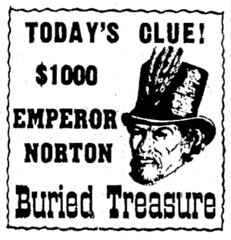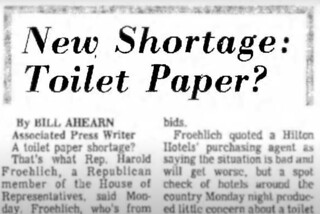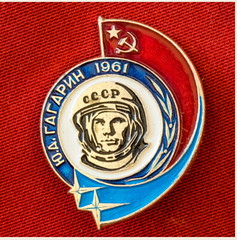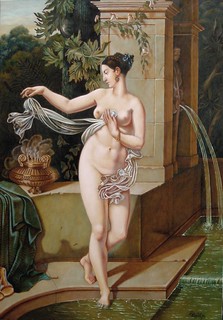
PREV ARTICLE
NEXT ARTICLE
FULL ISSUE
PREV FULL ISSUE
LOOSE CHANGE: APRIL 19, 2020Here are some additional items in the media this week that may be of interest. -Editor The Scrip Notes of Greenfield Mills, MD
John Sandrock's web site, The Currency Collector, was a Featured Web Site in The E-Sylum in 2016. I rediscovered it this week thanks to a mention in the April 14, 2020 (Volume V, Number 43) of the News & Notes email newsletter from the Society of Paper Money Collectors. The site's topics include Chinese coins and banknotes, siege notes, emergency money and more. For U.S. collectors, here's a well-researched article on the early scrip notes of Greenfield Mills, near Frederick, MD. -Editor  In the 1830s Greenfield Mills was a thriving farm community, replete with its own bank which issued scrip notes for the use of its citizens. Little evidence of Greenfield Mills past exists today, except for the bank notes themselves. When I started my search no one I questioned had ever heard of the place, nor could anyone tell me where it had once been located. A little detective work would ultimately enable the author to determine the answer to this mystery and to learn how the bank failed and why. To read the complete article, see:
Summary: Emperor Norton Treasure Hunt Material
John Lumea of the Emperor Norton Trust published an article that pulls together and amplifies on the San Francisco Chronicle Emperor Norton Treasure Hunt material discussed earlier. -Editor
To read the earlier E-Sylum articles, see:
A Civil War Love Story
Just for fun here's a completely non-numismatic story from Newspapers.com that will interest history buffs and romantics alike. But is it true, or fake news? -Editor
To read the complete article, see:
Shakespearean Insults
Fiction is often more interesting anyway. And for those who prefer history of an earlier time and place, you may enjoy this compendium of Shakespearean Insults. Add a few to your bag of tricks - and don't forget to try the Build Your Own Shakespearean Insult generator, you spongy rump-fed varlets! -Editor 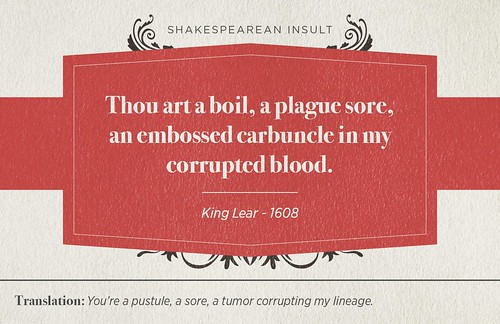 In addition to appreciating his literary contributions, Shakespeare enthusiasts understand and enjoy the snarky humor that is embedded in his work. His writing shows the power of language for its ability to make a statement and pack a punch. To celebrate Shakespeare's 454th birthday, we've compiled the best insults from some of his most famous works into a Shakespearean insult generator. To read the complete article, see:
The Toilet-Paper Shortage of 1973
This isn't the first toilet paper panic. Back in the days of the energy shortage an offhand joke kicked off a nationwide toilet-paper buying spree. Check out the video. -Editor
"I was completely blown away by the whole tale," the filmmaker Brian Gersten told me. His short documentary The Great Toilet Paper Scare, premiering on The Atlantic today, details the frenzy that ensued following Carson's remarks. "I found newspaper reports from every corner of the U.S. that had firsthand accounts of the chaos," Gersten said. He excerpted interviews and re-created them with absurdist animation for the film. "These scenes might seem a little hyperbolic," Gersten said, "but all of this stuff did actually happen, and people actually said those things." To read the complete article, see:
Collecting Russian Znachki
In the other-things-people-collect department is this Atlas Obscura article about Russian znachki (lapel pins). -Editor
Moeller, now a retired professor of European history, watched with fascination as pin collectors, mostly middle-aged men, approached the huge displays of znachki at the GUM department store by Red Square. "Each pin had a discrete number; they'd go in with the ones they were missing and make their orders from there," he says. Soon he, too, was hooked: "Here was a piece of history that you could pin to your lapel, material culture that embodied the past and celebrated the present." To read the complete article, see:
To read earlier E-Sylum articles, see:
Most Valuable Artwork Lost on the Titanic
Not numismatic, but of interest to the collector in all of us: this article discusses a valuable painting and other collectible rarities lost with the Titanic. -Editor
On the Titanic, Björnström-Steffansson befriended Hugh Woolner and the two were in the first class smoking lounge when the ship hit the fated iceberg. The two assisted others into lifeboats and just as the ship was about to completely submerge, they jumped into one of the last lifeboats, Lifeboat D, before they were rescued by RMS Carpathia, which brought the saved passengers to New York. Survivors heaped claims upon the White Star Line for loss of life and possessions. Björnström-Steffansson filed for $100,000 (over $2.5 million today) for the lost painting, the single largest claim in the $6 million worth of claims (about $150 million today). However, White Star Line settled for just $664,000 (about $17 million today) so it is unlikely Björnström-Steffansson received the full amount. Although the Blondel painting was considered the most valuable masterpiece aboard, other noteworthy works perished in the disaster, including a signed portrait of Italian nationalist Giuseppe Garibaldi and a bejeweled edition of the Rubaiyat, a Persian book of poetry dating to the 11th century. To read the complete article, see:
Wayne Homren, Editor The Numismatic Bibliomania Society is a non-profit organization promoting numismatic literature. See our web site at coinbooks.org. To submit items for publication in The E-Sylum, write to the Editor at this address: whomren@gmail.com To subscribe go to: https://my.binhost.com/lists/listinfo/esylum All Rights Reserved. NBS Home Page Contact the NBS webmaster 
|
